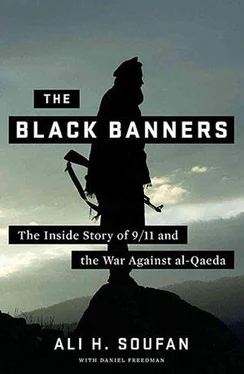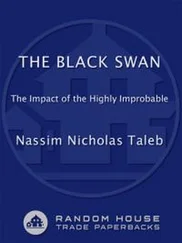When I first began interrogating al-Qaeda members, I found that while they could quote bin Laden’s sayings by heart, I knew far more of the Quran than they did—and in fact some barely knew classical Arabic, the language of both the hadith and the Quran. An understanding of their thought process and the limits of their knowledge enabled me and my colleagues to use their claimed piousness against them. I would even engage them in religious debate and convince them to cooperate and confess.
“Now that you’ve tested me on a hadith,” I said to Abu Jandal, “let me test you on one.”
“Sure,” he replied eagerly.
“Let me first ask you whether Christians and Jews are allowed in Mecca and Medina.”
“Of course not,” he replied, shaking his head and giving a condescending smile, “that’s a silly question. Everyone knows they’re forbidden. Even the Saudi Arabian monarchy, which welcomed infidels into the Arabian Peninsula, wouldn’t dare allow them in Mecca and Medina.”
“And why aren’t they allowed into Mecca and Medina?”
“Because they’re holy places.”
“Are you familiar with the hadith where the Prophet has dealings with his Jewish neighbor?” I asked.
“Of course.”
“Where did those conversations happen?”
“In Medina.”
“Did the Prophet commit a sin by allowing a Jew to live next door to him in Medina?”
“Umm,” Abu Jandal stuttered, and, after a pause, he replied, “No, the Prophet didn’t sin, the Prophet of course never sinned.”
“So tell me,” I pressed, “if the Prophet said it was okay for a Jew to live next door to him in Medina, how can you say you know more than the Prophet and that Jews and Christians can’t live in Medina today?”
Abu Jandal didn’t have an immediate response. Thinking for a few moments, he said: “But it is different after the Prophet’s death, because on his deathbed, according to the hadith, he said to expel all infidels from the Arabian Peninsula.”
“Hold on,” I said, “we both know that the Prophet forbade the writing of any hadith during his lifetime, as he wanted the focus to be on the Quran. Hadith were only written about one hundred years later. So you’re choosing what the Prophet allegedly said over what he actually did?”
Abu Jandal was at first silent, and then, looking flustered, he said, “Well, there are scholars who determine this.”
When the radio was first introduced in Saudi Arabia, conservative Wahhabi clerics denounced it as “the devil hiding in a box.” Wahhabism traditionally is suspicious of new technology, viewing modernity as an evil that takes people further away from the ideal way of life as practiced by the Prophet. The clerics demanded that King Abdul Aziz, Saudi Arabia’s founder and ruler, ban the radio and behead the Westerners who had brought it into the country.
The king relied on the clerics for domestic support and could not just dismiss their demands. “If what you say is true,” he told them, “then we must ban the devil’s work, and we will behead those behind it.”
“You are a great and wise king,” the clerics responded, excited that he was siding with them.
“And so,” the king said, “we will hold a public trial tomorrow about this devil box, and it will be brought before me.” The king then secretly told the engineers working on the radio to make sure that the Quran was playing at the time of the trial.
The next day, with the clerics present, the king ordered the radio to be brought before him. “Turn this box on,” he ordered, and as it was switched on, passages from the Quran were heard. The king, pretending to be confused, turned to the clerics and asked: “Can it be that the devil is saying the Quran? Or is it perhaps true that this is not an evil box?” The clerics conceded that they had been mistaken, and there was no more labeling of the radio as the devil’s box.
People ask what is the most important weapon we have against al-Qaeda, and I reply, “Knowledge.” What King Abdul Aziz understood is that often the most effective way to beat extremists is to outwit them. As Sun Tzu wrote in The Art of War , when we know our enemy’s strengths and weaknesses, and when at the same time we know our capabilities—that’s when we are best placed to achieve victory.
This is true in anything from deciding how to interrogate a suspect—whether to torture him or to outwit him to get information—to dealing with rogue states: do we simply resort to force, or do we first try to understand their thought processes and internal divisions and try to manipulate them? It’s the difference between acting out of fear and acting out of knowledge.
Our greatest successes against al-Qaeda have come when we understood how they recruited, brainwashed, and operated, and used our knowledge to outwit and defeat them. Our failures have come when we instead let ourselves be guided by ignorance, fear, and brutality. These failures explain why the approximately four hundred terrorists who were members of al-Qaeda on 9/11 have been able to last in a war against the greatest power on earth longer than the combined duration of the First and Second World Wars.
This book tells the story of America’s successes and failures in the war against al-Qaeda—from the origins of the organization right through to the death of Osama bin Laden on May 2, 2011 (May 1 in the United States)—with the aim of teaching people the nature of our enemy and how it can be defeated. I was fortunate to work alongside many heroes from the FBI, the Central Intelligence Agency (CIA), the NCIS, and other military agencies, and to work under great FBI leaders, such as Directors Robert Mueller and Louis Freeh, who understood the threat and what needed to be done. The successes in this book are theirs.
The story is told firsthand through what I saw and learned, and wherever possible I have used dialogue to allow readers to experience situations as they happened. These exchanges are as I remember them, or as colleagues and terrorists recounted them to me. Other conversations are drawn directly from official transcripts, wires, and unedited court documents. I am grateful to my former colleagues who took the time to look through the manuscript and verify what they read. Naturally, with the passage of time it’s difficult to remember conversations precisely word for word, and I trust that the reader will appreciate this when reading the conversations, and will understand that any errors are, of course, my own.
The reader should also be aware that this book was subjected to self-censorship to protect sources, methods, and classified material. It also went through the official government prepublication approval process. I have assigned certain CIA officers and government figures names other than their own; the practice will be obvious to the reader because anyone whose identity is thus obscured is referred to by a single first name only.
The aim of the book is to teach people how to understand al-Qaeda and how we can defeat them in the future, and any offense to specific individuals is unintended.
In on-site signage and much official government documentation, “Guantánamo” is unaccented when the word appears as part of the name of the American naval base and detention facility, but since the name of the bay itself is accented, and because that is the spelling recognized by readers and preferred by most mainstream publications, I have used it throughout.
Winter 1998. “So, Ali, now let me ask you a personal question.” I was having dinner with John O’Neill, my boss and the FBI special agent in charge of the National Security Division in the FBI’s New York office. We were at Kennedy’s, on West Fifty-seventh Street in midtown Manhattan, sitting at a table by the fireplace. It was John’s favorite spot in the restaurant, especially when the weather was cold, as it was that evening.
Читать дальше












